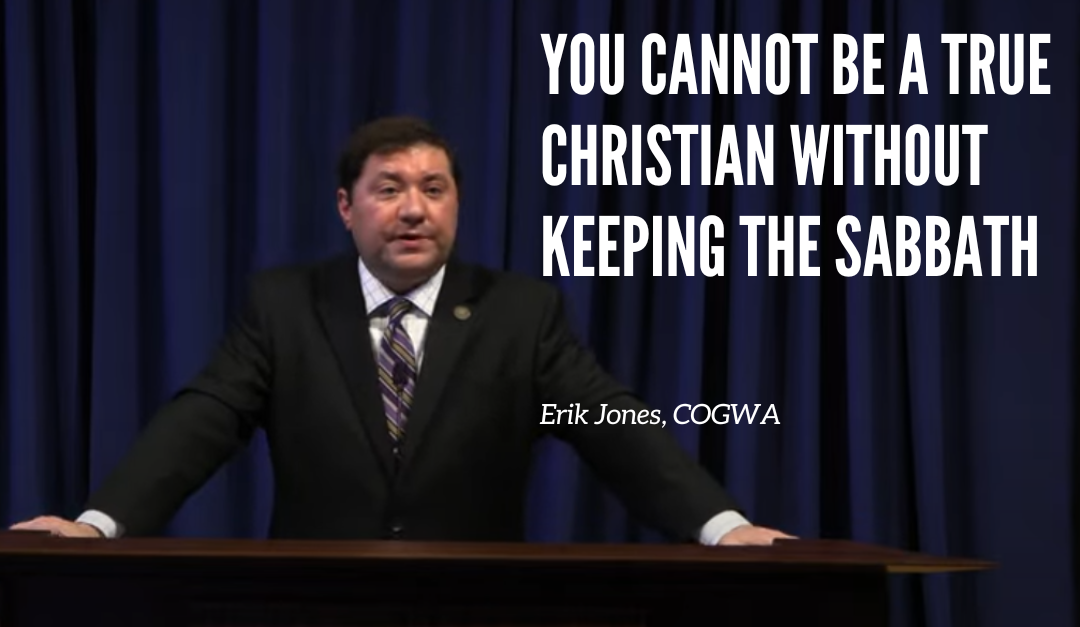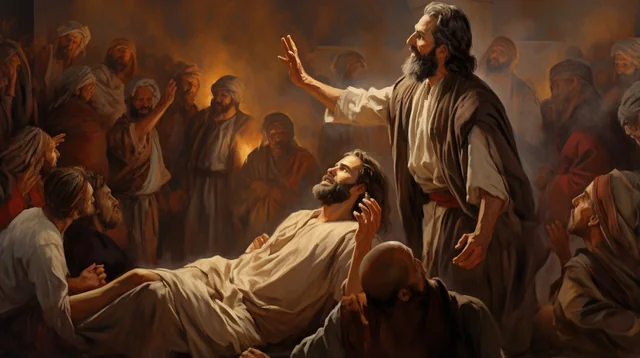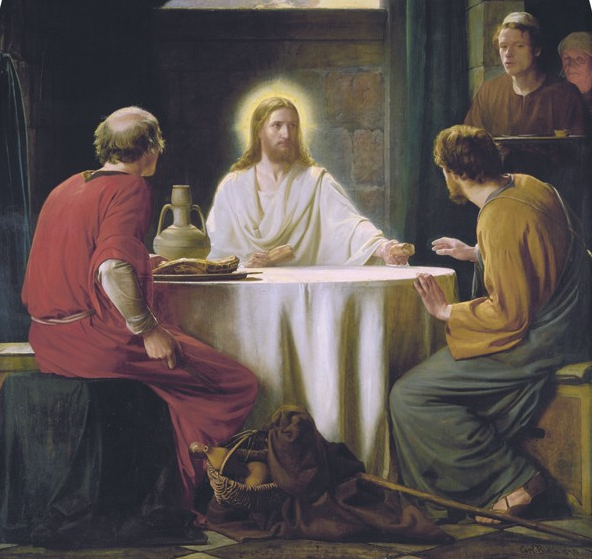For the first half of my life, I believed if a person does not observe the Sabbath on Saturday as commanded through Moses, and instead goes to church on Sunday, then that’s a sure sign he is a “false Christian.”
That view is still taught today by many Sabbathkeeping denominations like the one in which I was raised. For example, it’s plainly taught in a January 20, 2024, sermon entitled “The Biblical Definition of a Christian” by COGWA preacher Erik Jones:

You cannot be a true Christian without keeping the Sabbath. That is just the testimony of God’s Word. We don’t teach this to be elitist or exclusivist, but to stay faithful to the revealed word of Scripture. – Erik Jones
Like this preacher, I always meant well as a Sabbathkeeper and wanted to be faithful to Scripture, but it was only when I gave myself permission to think outside my denominational box that I was able see how Scripture actually presents the Sabbath in light of the practice of the New Testament Church.
I have already explained What I Didn’t Know About the Sabbath. In short, I learned that while the first Christians did evangelize the Jews on the Sabbath in the synagogues, we find no biblical example of established Christian churches meeting together for the Sabbath.
But that didn’t explain everything.
The remaining question
My quest to better understand the role of the Sabbath in the life of the Church naturally led me to look deeper into Sunday. Is there room for the tradition of Sunday observance in biblical Christianity?
This is important, because on the one hand, we have Jesus condemning the scribes and Pharisees for accepting tradition when he says, “You leave the commandment of God and hold to the tradition of men” (Mark 7:8).
On the other hand, we have the apostle Paul’s admonition to be faithful to tradition: “So then, brothers, stand firm and hold to the traditions that you were taught by us, either by our spoken word or by our letter” (2 Thessalonians 2:15).
So we must ask ourselves: Is Sunday observance an apostolic tradition – the kind that Paul exhorted us to keep? Or is it a “tradition of men,” the kind that Jesus rejected?
If all the talk about “don’t believe me, believe your Bible” was to be taken seriously, and not just as a catchy slogan, then I had to be open to what the evidence pointed to.
What I didn’t know
The biblical evidence pointed to at least two things I found unsettling at first. Yet, if I was to remain honest with the New Testament Scriptures, I could not ignore them:
- Each recorded case of Jesus making a post-Resurrection appearance in the Gospels takes place on a Sunday.
- The only day of the week on which we find Christian churches assembling is Sunday.
Once I stopped dismissing these biblical facts as trivial or incidental, I was forced to rethink my beliefs.
The “first day of the week” ☀️

I always knew that the phrase “first day of the week” was mentioned about eight different times in Scripture. But I believed Sundaykeepers relied too heavily on these verses – made too much of them to support their own practice.
This is how I reasoned: Just because something in the Bible is noted as happening on a particular day of the week, it doesn’t follow that one of the Commandments is somehow obliterated and replaced by a new practice.
So, to widen my perspective and perhaps find some counterexamples, I decided to do a search for the broader phrase “day of the week” – not just “first day of the week” – and look more closely at each passage. My search results were interesting:
| Day of the Week | Times Used in the Bible |
|---|---|
| “first day of the week” | 8* |
| “second day of the week” | 0 |
| “third day of the week” | 0 |
| “fourth day of the week” | 0 |
| “fifth day of the week” | 0 |
| “sixth day of the week” | 0 |
| “seventh day of the week” | 0 |
*(the last occurance is actually phrased “first day of every week”)
In other words, I couldn’t find counterexamples because there are none. The only mention in all the Bible of a “day of the week” – using that nomenclature – is the first day.
Given that this naming convention is not the common practice of the Bible’s inspired writers, I had to ask myself why they write so conspicuously of the “first day of the week”: Sunday. There must be something behind that, something special about it.
In the Gospels
These “first day” verses in the Gospels are easy to find. You can do a search online or in a concordance – or you can simply grab your Bible and flip to the last one or two chapters of each of the four Gospels. Check them out for yourself.
☀️ Matthew 28:1:
Now after the Sabbath, toward the dawn of the first day of the week, Mary Magdalene and the other Mary went to see the tomb.
☀️ Mark 16:2:
And very early on the first day of the week, when the sun had risen, they went to the tomb.
☀️ Mark 16:9:
Now when [Jesus] rose early on the first day of the week, he appeared first to Mary Magdalene…
☀️ Luke 24:1:
But on the first day of the week, at early dawn, they went to the tomb, taking the spices they had prepared.
☀️ John 20:1:
Now on the first day of the week Mary Magdalene came to the tomb early, while it was still dark, and saw that the stone had been taken away from the tomb.
☀️ John 20:19:
On the evening of that day, the first day of the week, the doors being locked where the disciples were for fear of the Jews, Jesus came and stood among them and said to them, “Peace be with you.”
I couldn’t get around it: The term “first day of the week” is used only at the end of each Gospel, written by four different writers, and used only in relation to the Resurrection of Jesus. It’s as if it is worded that way deliberately, for a certain purpose.
We’ll get to that reason later.
In the Church’s practice
But the Gospel accounts are not the only places where the “first day of the week” is mentioned. Twice, it is mentioned in conjunction with particular (local) churches:
☀️ Acts 20:7:
On the first day of the week, when we were gathered together to break bread, Paul talked with them, intending to depart on the next day, and he prolonged his speech until midnight.
☀️ 1 Corinthians 16:2:
On the first day of every week, each of you is to put something aside and store it up, as he may prosper, so that there will be no collecting when I come.
Let’s look at these one at a time.
The truth about Troas (Acts 20:7-16)
In this first mention, we read of a Christian meeting held in the city of Troas. The apostle Paul was planning to leave the next day, so he took the occasion to preach a long time – so long that a young man named Eutychus, who was sitting on a third-story window, fell asleep. In so doing, Eutychus literally fell to his death.
Paul “went down” and bent over to pick up the dead young man, and said, “Do not be alarmed, for his life is in him.”
The man was brought back to life – resurrected by a miracle!

Paul is then said to have “gone up” again, where he is described as having “broken bread and eaten,” a term used to describe what many call the “Lord’s Supper.”
Interestingly, here again we have the “first day of the week” tied to a resurrection. And this time, it is also when they break bread as a Christian community.
By the way, “breaking bread” can be used to describe a common meal – like a potluck supper – but not in every context. Not in most contexts in the New Testament.
In this context, we see a death and resurrection occur just before Paul broke bread (verses 10-11). If this breaking of bread was a reference to a common meal (in the middle of the night!), the abrupt shift would hardly seems appropriate – going from performing this kind of extraordinary miracle to indulging his midnight munchies.
It makes more sense that Paul was observing the Lord’s Supper – and at a time most fitting to hold a “thanksgiving” offering.
Luke and the breaking of bread
For more evidence that to “break bread” has a Christian rather than a common meaning, recall how Luke (who also wrote the Acts of the Apostles, a follow-up to his Gospel) describes the first “Lord’s Supper”:
And [Jesus] took bread, and when he had given thanks, he broke it and gave it to them, saying, “This is my body, which is given for you. Do this in remembrance of me.” (Luke 22:19)
This was a “religious” event, a paschal meal.
If you compare the description of Jesus breaking bread at the Last Supper with the description of the resurrected Jesus breaking bread with the men on the road to Emmaus (chapter 24), you will see the same language:
When [Jesus] was at table with them, he took the bread and blessed and broke it and gave it to them. And their eyes were opened, and they recognized him. And he vanished from their sight. They said to each other, “Did not our hearts burn within us while he talked to us on the road, while he opened to us the Scriptures?” … Then they told what had happened on the road, and how he was known to them in the breaking of the bread. (Luke 24:30-35; cf. 1 Corinthians 11:23-24)

Notice the striking resemblance between these two accounts. Clearly, in the Bible, “breaking bread” is not always a social potluck, or a means to curb the appetite or to avoid getting hangry. It has holy, Christian significance.
Another point of interest: Do you know what day it was when they broke bread on the road to Emmaus? You guessed right – it was on “the first day of the week” (Luke 24:13; cf. 24:1)! Is it a coincidence that Luke mentions two different breakings of bread, with both occuring on a Sunday?
The religious connotation of breaking bread falls in line with how Luke has already described the Church’s activity:
And they devoted themselves to the apostles’ teaching and the fellowship, to the breaking of bread and the prayers. (Acts 2:42)
It’s a stretch to imagine that the first Christians devoted themselves to potlucks as they did to their prayers and the apostles’ teaching. That doesn’t mean, of course, that in the beginning they didn’t partake of a larger communal meal, but the meal’s central feature was taking the bread, blessing it, breaking it, and giving it to the followers of Jesus in commemoration of the Lord’s Supper. (This was not limited to once a year during the Jews’ Passover. “For as often as you eat this bread and drink the cup, you proclaim the Lord’s death until he comes” – 1 Corinthians 11:26.)
The collection in Corinth (1 Corinthians 16:1-4)
Now, the other mention of the “first day of the week” (outside of the Gospels) is in 1 Corinthians 16, which regards a church collection.
Again, verse 2 is the pertinent verse:
On the first day of every week, each of you is to put something aside and store it up, as he may prosper, so that there will be no collecting when I come.
Paul wanted a collection to be taken up for the needy brethren in Jerusalem. But why does Paul instruct everyone to set aside their contributions ahead of time on “the first day of every week” – which is to say, every Sunday until he arrived?
I don’t know the exact logistics of this collection, and I don’t have to know every detail. The detail that stands out is the plain one, the deliberately and explicitly made one – that the collection was to be made not on any day, but on Sunday, the “first day of every week.”
People can set aside and store up things anytime – so what a strange, arbitrary request if Sunday wasn’t already meaningful!
But what if it wasn’t so strange? What if the apostle Paul was simply referencing a practice his Christian readers were already accustomed to: Sunday church services?
After all, the apostle had just been talking about preaching, which happens at church (15:1-2,11-14). He spoke about orderly worship as it pertains to tongues and prophecy and women speaking – at church (chapters 13-14). He discussed the spiritual gifts belonging to members of the church (chapter 12). He instructed women with regard to head coverings, and warned against abuses and unworthy reception of the Lord’s Supper – at church (chapter 11).
Is it really so difficult, then, to see and admit that this collection was a church collection – at church – set aside each Sunday, on the “first day of every week”? If it sounds like the apostle Paul was describing a Sunday church collection, it’s because he was!
While I confess this was at first difficult for me to accept, it was not hard to see.
Why the references to the “first day of the week” in the Gospels
Now let’s circle back on this “first day of the week” business. Do you remember how no other “day of the week” is mentioned in the Bible?
I had to ask why the “first day of the week” was included in all the Resurrection appearances of Jesus in all the Gospels (Matthew 28:1; Mark 16:2; Mark 16:9; Luke 24:1; John 20:1; John 20:19).
This reasonable answer clicked for me: All these references to the “first day of the week” were the biblical writers’ way of pointing out the apostolic origin of Sunday observance! By the time these accounts were written, the practice had already begun. It did not creep in later through the infiltration of pagan sun worshipers, as some have suggested, and it most decidedly did not originate at the Council of Nicea in A.D. 325. It was established by the apostles themselves!
So instead of introducing their readers to Sunday observance, or trying to convince them of it, the writers simply reference the underlying reason for the Church’s existing practice. They do this by drawing attention to “the first day of the week,” deliberately tagging it to the Resurrection.
The Moral Law

If all this is true, it’s also apparent that the apostles had no problem understanding the Sabbath Commandment the way traditional Christians do today.
Strictly and historically speaking, the Ten Commandments were delivered to the children of Israel, not to us Gentiles. Yet it’s clear that the Ten Commandments are a summary of God’s moral instructions for everyone. Unlike many laws we find in the Old Testament, these Commandments are binding on all peoples in all places through all the ages. They are not merely Jewish ritual or ceremonial laws, but moral laws concerning right and wrong.
Yet, tucked inside the Sabbath Commandment is a ceremonial component not essential to its moral force.
The moral force of the Sabbath Commandment is that since we owe everything to God, who gave us everything we have, it is right and just that we set aside holy time dedicated to the special worship of God.
The ceremonial component, on the other hand, is the specific day of the week.
Of course, a very strict reading of the Commandment doesn’t even specify a particular “day of the week.” It says, “Six days you shall labor, and do all your work, but the seventh day is a Sabbath to the Lord your God” (Exodus 20:9-10). Sunday observance does not violate the principle of working six days and resting the following day. It continues the same weekly rhythm of the Mosaic Sabbath, but recalls the beginning of Christ’s New Creation, which began with his Resurrection – which was manifested on the “first day of the week.”
The specific day ancient Israel was expected to “remember” fell in line with God’s instructions regarding the manna he provided. The “seventh day” was simply counted from the day when the children of Israel first saw manna – the miraculous bread from heaven.
We find this in Exodus 16, which is the first time we see God instructing anyone to keep a particular holy day of rest.
On the sixth day [after God first provided them with manna – see verses 14-16] they gathered twice as much bread, two omers each. And when all the leaders of the congregation came and told Moses, he said to them, “This is what the Lord has commanded: ‘Tomorrow is a day of solemn rest, a holy Sabbath to the Lord; bake what you will bake and boil what you will boil, and all that is left over lay aside to be kept till the morning.’” So they laid it aside till the morning, as Moses commanded them, and it did not stink, and there were no worms in it. Moses said, “Eat it today, for today is a Sabbath to the Lord; today you will not find it in the field. Six days you shall gather it, but on the seventh day, which is a Sabbath, there will be none.” (Exodus 16:22-26)
Obviously, God did not perform this miracle of grace for the people of Egypt, and he made no such demands of other Gentile nations.
The bread from heaven was given in such a way that the Israelites were forced to work six days in order to eat it, but then they had to rest the next day. This weekly cycle continued throughout their 40-year wilderness wanderings – that is, until they entered the promised land of rest.
Christians do not partake of, and are not mourished by, that same manna which was given to Israel. Rather, both Jew and Gentile Christians alike partake of, and are nourished by, the true Bread from Heaven (John 6:51) – Jesus, in whom they find their true rest.
Just as the old bread from heaven appeared to God’s people on that first day, so the True Bread from Heaven appeared to his disciples on the “first day of the week.” While the manna was meant for Israel alone (along with anyone else who joined themselves to Israel’s community), the Resurrection was meant to bless everyone in all nations.
Christians still work six days and rest the seventh, in compliance with the Commandment, but our day of rest – established by the apostles – is the day on which Jesus appeared to us in resurrected glory.
If the apostles saw no conflict in keeping holy the first day of the week versus the seventh day of the week, then who are we to contradict them, especially in light of the Resurrection, recognizing “that in Christ Jesus the blessing of Abraham [came] upon the Gentiles” (Galatians 3:14)?
It’s the same moral principle, but merely a new day in order to reflect a new reality. The new day is the day Jesus showed himself raised from the dead after his salvific “work week” in Jerusalem (a.k.a., “Passion Week”). It’s the day on which God’s New Creation was inaugurated – when the doors were first opened for all of us to enter his rest (Hebrews 4).
The verdict
Earlier, I asked whether the observance of Sunday was an example of what Jesus condemned as a “tradition of men” (Mark 7:8).
Judging by the practice of the New Testament Church as shown in the Bible, and the practice of the very next generation that we find in the writings of the Early Church Fathers, it’s clearly the kind of tradition Paul wanted us to keep:
So then, brothers, stand firm and hold to the traditions that you were taught by us, either by our spoken word or by our letter. (2 Thessalonians 2:15)
We can’t know every “spoken word” of the apostles, but we can get a sense of their oral teaching by looking at the practice and beliefs of the Church – including how and when the Church worshiped.
Regarding Sunday, I believe we can see that practice clearly enough even through the written “letter” alone.
Had I ignored these mentions of the “first day of the week,” hand-waving them away as not meaningful or important, then I would have been guilty of what I accused others of: clinging to denominational traditions and not trusting the Sacred Tradition of Sacred Scripture.
I had to humbly concede what should have been obvious, for even the Psalmist alludes to this glorious day:
The stone that the builders rejected has become the cornerstone [a reference to Jesus, cf. Matthew 21:42; Mark 12:10; Luke 20:17; Acts 4:11; 1 Peter 2:7]. This is the Lord’s doing; it is marvelous in our eyes. This is the day that the Lord has made; let us rejoice and be glad in it.
Thank God that divisive disputes about the Sabbath and Sunday were long ago put to rest.
